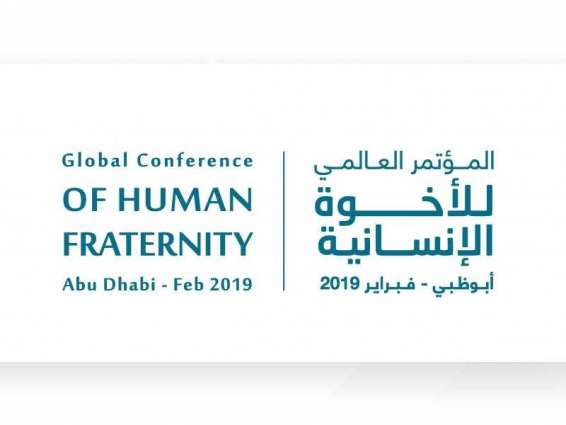(Pakistan Point News - 03rd Feb, 2019) ABU DHABI, 3rd February, 2019 (WAM) - The two-day Global Conference of Human Fraternity got under way today at Emirates Palace Abu Dhabi with a session titled ‘Principles of Human Fraternity’, chaired by Noura Al Kaabi, UAE Minister of Culture and Knowledge Development.
The plenary session examined the importance of citizenship, combating extremism, promoting dialogue, and defending the oppressed and persecuted.
The all-female panel of experts discussed the concept of human fraternity and mutual recognition, based on respect and trust in the essential goodness of humanity. The session focused on the sustained efforts in building real bridges of human communication, as well as the role of women in achieving productive cooperation, filled with trust, respect, and love. Its goal was to support people around the world in turning a new page in human relations to counter extremist thought and related aspects.
Panellists included Dr Nabila Makram, Egypt’s Minister of State for Migration and Expatriate Affairs, Reverend Kosho Niwano, President-Designate of Rissho Kosei-kai, Reverend Marie Sol Villalon, Pastor of the United Methodist Church, the Venerable Dr Chung Ohun Lee, President of the Won Buddhist International, and Dr Fadia Kiwan, Director General of the Arab Women Organisation.
In her opening remarks, Noura Al Kaabi said, "I take this opportunity to welcome my fellow panellists, all of whom are experts in their respective fields, to the UAE – the land of tolerance. Fruitful cooperation and open communication are the catalysts of peaceful co-existence that promote tolerance, love, and respect across communities."
She stressed the need to achieve balance between the majority of mankind – the 99 per cent – and the wealthy one per cent, in order to the ideals of human fraternity, tolerance, and acceptance .
For her part, Dr Nabila Makram said, "I thank the UAE for its cordial invitation to participate in this important platform that has brought us together to debate profound ideals. To reinforce the pillars of human fraternity, we need to shape the minds of our children at home, in schools, across communities and through laws that govern our land. The UAE, in line with the noble values championed by its Founding Father, the late Sheikh Zayed bin Sultan Al Nahyan, has paved the way for tolerance."
She added: "Human fraternity principles are deeply rooted in our Arab culture. We need to capitalise on this strength, join forces and assemble at the Arab League to develop a strategy for sharing our multi-cultural, noble, fraternal, and peaceful values with the rest of the world."
Dr Fadia Kiwan said, "The three monotheistic religions – islam, Christianity and Judaism – have common elements and teachings. We need to work together, and instead of politicising religion, promote our shared values, combat extremism, encourage solidarity, eliminate the marginalisation of women, and uphold the principles of human rights and fraternity."
Reverend Kosho Niwano added, "Buddhism holds pliability at its core. It encourages examining one’s own right and wrong. This teaching is an important pillar of acceptance and tolerance, and a key contributor to building the bridges of communication among all."
Reverend Marie Sol Villalon said, "True religion caters to the most oppressed and ensures inclusivity in the community. Women have a fundamental role in promoting these ideals and values of love, peace, sharing, giving, respect, and tolerance."
The Venerable Dr Chung Ohun Lee added, "Human fraternity stems from fundamental human rights. To ensure its success, we need to uphold these rights, encourage the well-being of all mankind, put a stop to the rampant increase in materialism, and promote spiritual happiness and unity."
The discussion was followed by three workshops on tolerance and coexistence that explored ways of strengthening human fraternity and expanding its values across the globe.
Commenting on the session, Dr Sultan Al Remaithi, Secretary General of the Muslim Council of Elders, said, "In line with the profound message the Muslim Council of Elders is sharing, the session highlighted the important role of women in advocating for tolerance. Their role in society is integral in delivering the message of peace, coexistence and harmony. They are key enablers in disseminating the values of human fraternity. Together, and through joint efforts in women empowerment we can continue to broaden their reach and impact."
Fraternity is best measured by the strength of cooperation among all stakeholders as well as their commitment to maintaining good will for the benefit of humanity. Establishing a culture of peace, reinforcing the concept of citizenship, and combating religious extremism are realistic starting points to achieving human fraternity.
The Global Conference of Human Fraternity runs until 4 February at Emirates Palace Abu Dhabi and is being held under the patronage of His Highness Sheikh Mohamed bin Zayed Al Nahyan, Crown Prince of Abu Dhabi and Deputy Supreme Commander of the UAE Armed Forces. Organised by the Muslim Council of Elders, an Abu Dhabi-based independent international organisation headed by His Eminence the Grand Imam of Al Azhar, Sheikh Ahmed El-Tayeb, the gathering is attended by globally renowned religious, intellectual and media personalities.
The event takes place in conjunction with the historic visit of His Holiness Pope Francis, head of the Catholic Church, and His Eminence the Grand Imam of Al Azhar, Sheikh Ahmed El-Tayeb, to the UAE. Under the theme ‘Make me a Channel of Your Peace’, the visit represents a call for global fraternal collaboration based on peaceful dialogue, mutual tolerance, and a rejection of extremism and violence.
The conference focuses on a wide spectrum of themes, including ‘Principles of Human Fraternity’, ‘Common Responsibility to Achieve Human Fraternity’ as well as ‘Human Fraternity: Challenges and Opportunities’.




